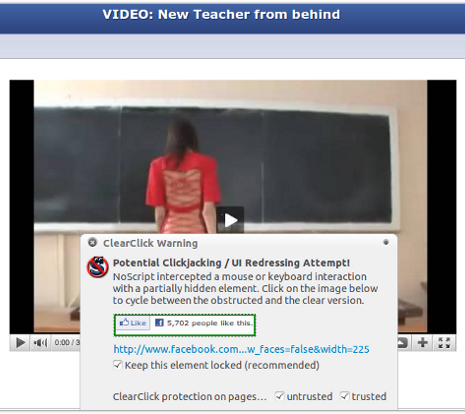Scam warning: When our new teacher terns towards a blackboard students are go haywire. VIDEO: New Teacher from behind

The Facebook scams keep coming, and the latest one has a few noteworthy twists. It doesn't use a celebrity's name and is simply titled "New teacher from behind." It starts off with a link and then follows with the text "When our new teacher terns towards a blackboard students are go haywire. VIDEO: New Teacher from behind." Tens of thousands of users were affected by this one.
Unlike previous "likejacking" scams (a play on the term clickjacking, which means prompting a victim to click something while a different action is taken behind the scenes), this one uses many different URL shorteners, including goo.gl, tiny.cc, and tinyurl.com. It even sometimes includes direct URLs to websites registered on .info and .ro top-level domains. This attack only requires that you are using a modern browser and are logged into a Facebook account. It works regardless of the operating system your device uses, including Windows, OS X, Linux, iOS, Android, and so on, according to Sophos.
Once you click the link, you're taken to a webpage with a fake video player window, which is overlayed with a hidden iframe; clicking on it anywhere will also submit a Facebook Like and spread the post to your Facebook page. The scammer earns his or her money via a commission for every survey completed. Those who fell for this particular scam report that they were infected with malware. Furthermore, you should never hand over your mobile phone number as scammers will sign you up for a premium rate SMS service.
As I've recommended before, if you see a scam like this one, report it. Then go check your own wall to make sure you're not spreading the scam; the sooner you clean it up and unlike the page, the better. You can even contact Facebook Security if you'd like to. Some security suites as well as the Firefox add-on NoScript will prevent the likejacking from taking place.
